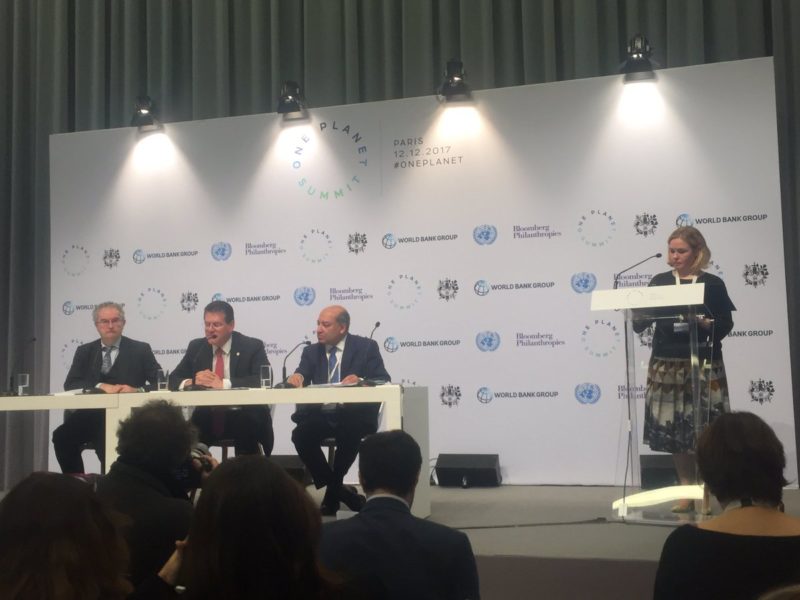The “Land Degradation Neutrality Fund” initiative promoted by the United Nations Convention to Combat Desertification (UNCCD) and Mirova (Natixis) to support sustainable land use practices globally was highlighted as a concrete and innovative climate action during the One Planet Summit held on Tuesday, December 12, 2017 in Paris, France. Initial investors, including the European Investment Bank and the Agence Française de Développement, have announced financial commitments totalling more than $100 million out of a target of $300 million.

At the One Planet Summit, organised to celebrate the second anniversary of the Paris Agreement, the “Land Degradation Neutrality Fund” initiative was hailed by Jean-Yves Le Drian, French Minister for Europe and Foreign Affairs, as an innovative solution that aligns sustainable land management with the ambition of the Paris Agreement. Developed by the UNCCD and Mirova, an affiliate of Natixis Investment Managers who also provided initial seeding for the Fund, it is one of the responses to the call for public and private finance in support of global climate action.
Restoring degraded land is a huge, yet greatly underestimated and underutilised opportunity to reduce greenhouse gas emissions and to adapt to climate change. By putting sustainable land use at the heart of its climate action, the “Land Degradation Neutrality Fund” initiative addresses the three summit objectives:
- Act concretely and collectively: This joint effort to put finance at the service of climate action is the outcome of a unique coalition of actors. It will invest in sustainable land management practices all over the world that have already been shown to be effective, but need suitable financing and technical assistance.
- Innovate: This will be the first investment vehicle to focus on a Sustainable Development Goal (SDG) target, and using an innovative public private partnership structure. Success could motivate the development of new investment vehicles for the goals.
- Support one another: Climate change is a global issue, but the effects are distributed unevenly, with especially negative impacts on land users. Acting on a global scale, this investment vehicle will therefore provide flexible financing solutions where traditional bank funding is not available.
As early supporter of the fund, all the way through the design and structuring phases, the European Investment Bank was joined by the Agence Française de Développement to become the anchor investors. Other institutional investors include Fondaction, the first north-American private investor, foundation Fondation de France, insurance companies BNP Paribas Cardif and Garance. The initiative is also backed by de-risking partners including the Government of Luxembourg, IDB Invest and the Global Environment Facility. In total, investors have announced commitments of over $100 million out of a target of $300 million.
“The public sector must be bold and inventive to unleash a revolution in development and entrepreneurship that can tackle the manifold and complex challenges before us – climate change, loss of productive land, lack of jobs, forced migration, droughts, floods, the list seems endless. The moment we see the land differently our horizons open wide. Then, the options and possibilities are endless,” says Monique Barbut, Executive Secretary of the UNCCD.
“Implementing such private public schemes is both a challenge, through the pioneering dimension of the approach and the challenge of coordination, but also a great opportunity, through the exchange of knowledge and know-how. Mirova, as a management company dedicated to responsible investment, is committed to supporting initiatives to redirect financial flows towards sustainable development,” comments Philippe Zaouati, CEO of Mirova.
Jean Raby, CEO of Natixis Investment Managers added: “We believe it’s our responsibility, as financial institution, to play a role in the transition to a low-carbon and climate resilient economy. This initiative is in line with Natixis’ commitments to provide concrete and creative climate solutions.”
European Investment Bank Vice President, Jonathan Taylor, said: “Land degradation has negative impacts on water, food and energy security, climate change and biodiversity. That’s why, as the EU Bank, we are proud to support the Land Degradation Neutrality Fund – a first of its kind public private partnership, attracting investments for sustainable land management and land restoration projects.
“This is important for two reasons: one, because we need pilots like this investment vehicle to demonstrate that investing in land degradation neutrality is good business for the private sector; and two because it is key to deliver on the Sustainable Development Goals and Paris Climate targets. We are committed to making the Paris Agreement a reality. Outside the EU, we have pledged 35% of total financing for climate action by 2020. This includes an increased focus on impact, adaptation and mainstreaming climate change considerations into everything we do.”
For Rémy Rioux, CEO of the Agence Française de Développement: “AFD is excited to join forces with other investors for financing climate resilient projects through Land Degradation Neutrality Fund and to participate to the emergence of a new asset class. This initiative complements AFD’s intervention in supporting transition through sustainable management of natural capital resources as common goods, and improving socio-economic conditions for family farmers. The investment policy of Land Degradation Neutrality Fund is in line with our commitment to foster the Paris Agreement implementation.”
Pascal Canfin, Managing Director of WWF France, says: “Every year, no less than 12 million hectares of arable land are degraded – the equivalent of one football field every two seconds – having major consequences on climate and food security. This Land Degradation Neutrality Fund, the biggest public private fund for sustainable land and followed by WWF France since its creation, is a great opportunity to channel investments towards innovative projects for land restauration. It therefore participates in the fight against climate change and global insecurity, and aims at ensuring food security especially for the most vulnerable populations.”
